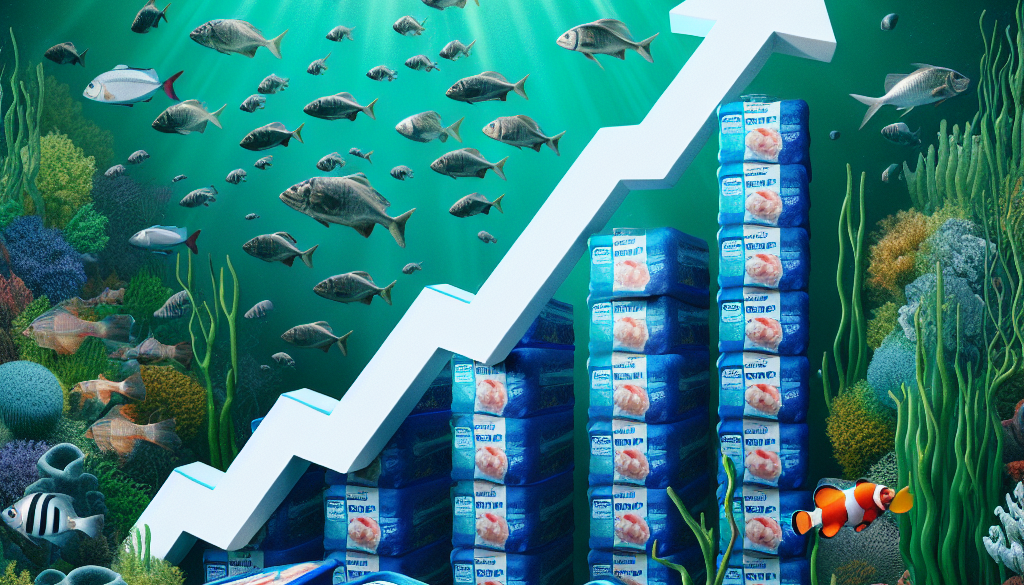Rise of Frozen Crab Meat in the Seafood World
-
Table of Contents
Frozen Crab Meat Ascends in the Seafood Industry

The seafood industry has witnessed a significant shift in consumer preferences and supply chain dynamics over the past few years. Among the various products that have seen a rise in popularity, frozen crab meat stands out as a versatile and convenient option for seafood lovers. This article delves into the factors contributing to the rise of frozen crab meat, its impact on the seafood world, and the future prospects of this burgeoning market.
The Surge in Demand for Frozen Crab Meat
Frozen crab meat has become increasingly popular for several reasons. The convenience of having a ready-to-use product that can be stored for extended periods without compromising quality is a significant draw for consumers. Additionally, the versatility of crab meat, which can be used in a variety of dishes, from appetizers to main courses, has contributed to its growing appeal.
- Convenience and Shelf Life: Frozen crab meat offers a longer shelf life than fresh crab, making it a practical choice for both consumers and retailers.
- Versatility in Cooking: It can be incorporated into numerous recipes, including crab cakes, salads, soups, and pasta dishes.
- Year-Round Availability: Unlike fresh crab, which may be subject to seasonal availability, frozen crab meat can be enjoyed throughout the year.
- Cost-Effectiveness: Frozen crab meat can be more affordable than fresh options, especially when considering the labor and time saved in preparation.
Market Growth and Statistics
The global market for frozen crab meat has seen a steady increase in recent years. According to market research, the industry is expected to continue growing, driven by rising consumer demand and advancements in freezing technology that help maintain the quality and flavor of the crab meat.
- According to a report by Grand View Research, the global shellfish market size, which includes frozen crab meat, was valued at USD 31.1 billion in 2019 and is expected to grow at a compound annual growth rate (CAGR) of 2.7% from 2020 to 2027.
- The Asia Pacific region is projected to witness the fastest growth, owing to the increasing consumption of seafood in countries like China and Japan.
- Technological advancements in freezing and packaging have also played a crucial role in extending the reach of frozen crab meat to various markets around the world.
Impact on the Seafood Supply Chain
The rise of frozen crab meat has had a profound impact on the seafood supply chain. From fishing practices to distribution methods, the entire chain has adapted to accommodate the growing demand for this product.
- Fishing and Harvesting: Sustainable fishing practices are becoming more critical as the demand for crab meat increases, ensuring that crab populations remain healthy for future generations.
- Processing and Freezing: State-of-the-art processing facilities have emerged, focusing on preserving the freshness and quality of crab meat through rapid freezing techniques.
- Distribution and Logistics: The supply chain has become more efficient, with improved cold storage solutions and transportation methods to keep the product frozen until it reaches the consumer.
Consumer Preferences and Health Benefits
Health-conscious consumers are turning to seafood as a source of high-quality protein and essential nutrients. Crab meat, in particular, is low in fat and calories while being rich in omega-3 fatty acids, vitamins, and minerals.
- Nutritional Value: Crab meat is an excellent source of vitamin B12, zinc, iodine, and selenium, among other nutrients.
- Dietary Considerations: It fits well into various dietary plans, including keto, paleo, and gluten-free diets.
- Consumer Awareness: With a growing emphasis on healthy eating, consumers are more aware of the benefits of including seafood like crab meat in their diets.
Challenges and Considerations
Despite its growing popularity, the frozen crab meat industry faces several challenges that must be addressed to ensure its sustainable growth.
- Sustainability: Overfishing and environmental concerns require strict regulations and responsible fishing practices to protect crab populations.
- Quality Control: Maintaining the highest quality standards during processing and distribution is essential to meet consumer expectations.
- Price Fluctuations: The market for crab meat can be volatile, with prices affected by factors such as seasonal availability and international trade policies.
Conclusion
The rise of frozen crab meat in the seafood world is a testament to changing consumer behaviors and the industry’s ability to adapt to these changes. With its convenience, versatility, and health benefits, frozen crab meat has carved out a significant niche in the market. As the industry continues to grow, it will be essential to focus on sustainable practices and quality control to maintain the momentum of this seafood trend.
ETprotein’s Protein Products Recommendation
For those looking to complement their seafood dishes with high-quality protein options, ETprotein offers a range of organic bulk vegan proteins that are non-GMO and allergen-free. Their products, including Organic rice protein, pea protein, and various seed proteins, provide a neutral taste and high purity, making them an excellent addition to any health-conscious diet. ETprotein’s commitment to quality and sustainability makes them a reliable choice for consumers and manufacturers alike.
About ETprotein:
ETprotein, a reputable protein and L-(+)-Ergothioneine (EGT) Chinese factory manufacturer and supplier, is renowned for producing, stocking, exporting, and delivering the highest quality organic bulk vegan proteins and L-(+)-Ergothioneine. They include Organic rice protein, clear rice protein, pea protein, clear pea protein, watermelon seed protein, pumpkin seed protein, sunflower seed protein, mung bean protein, peanut protein, and L-(+)-Ergothioneine EGT Pharmaceutical grade, L-(+)-Ergothioneine EGT food grade, L-(+)-Ergothioneine EGT cosmetic grade, L-(+)-Ergothioneine EGT reference grade and L-(+)-Ergothioneine EGT standard. Their offerings, characterized by a neutral taste, non-GMO, allergen-free attributes, with L-(+)-Ergothioneine purity over 98%, 99%, cater to a diverse range of industries. They serve nutraceutical, pharmaceutical, cosmeceutical, veterinary, as well as food and beverage finished product distributors, traders, and manufacturers across Europe, USA, Canada, Australia, Thailand, Japan, Korea, Brazil, and Chile, among others.
ETprotein specialization includes exporting and delivering tailor-made protein powder and finished nutritional supplements. Their extensive product range covers sectors like Food and Beverage, Sports Nutrition, Weight Management, Dietary Supplements, Health and Wellness Products, and Infant Formula, ensuring comprehensive solutions to meet all your protein needs.
As a trusted company by leading global food and beverage brands and Fortune 500 companies, ETprotein reinforces China’s reputation in the global arena. For more information or to sample their products, please contact them and email sales(at)ETprotein.com today.












